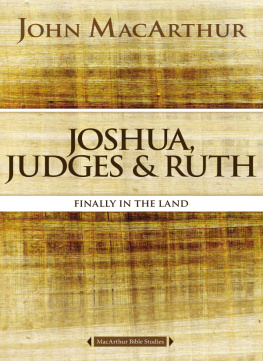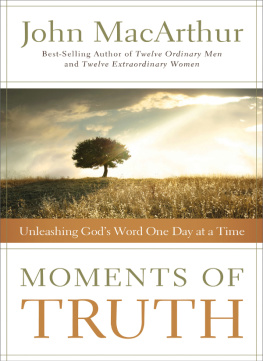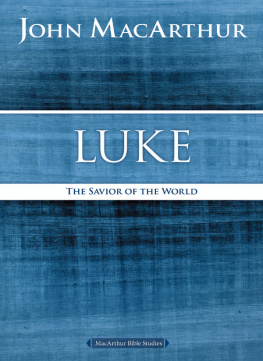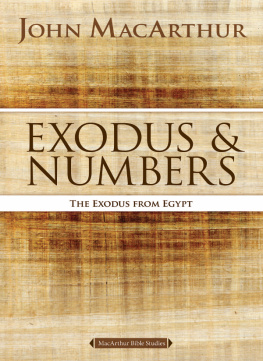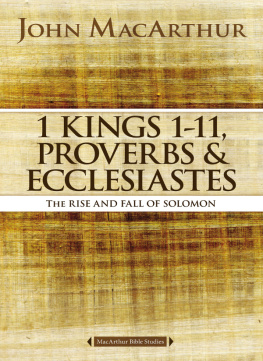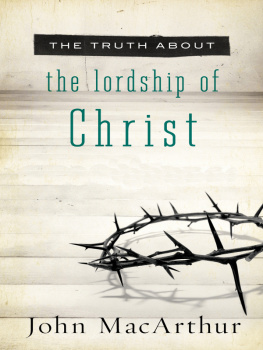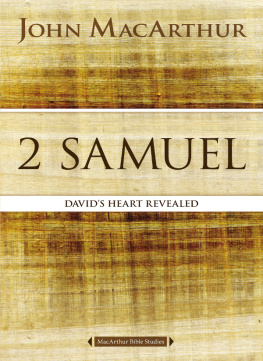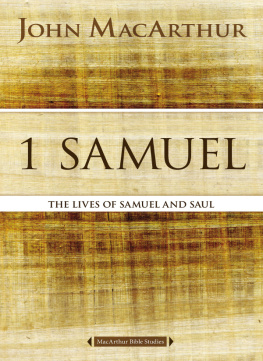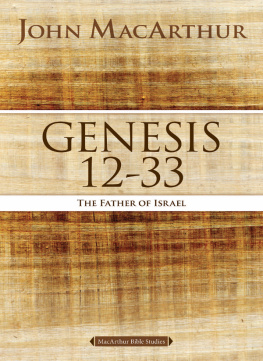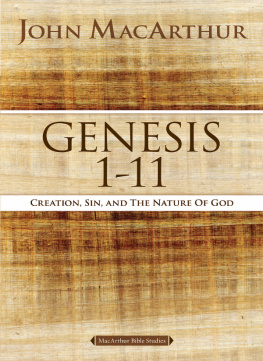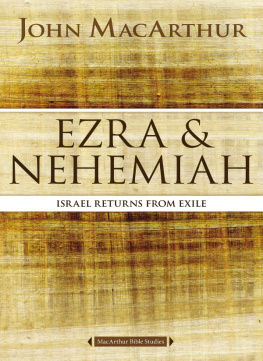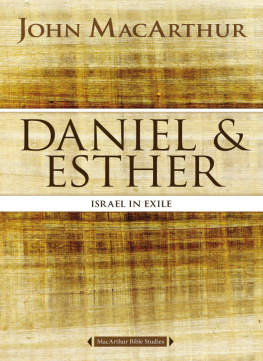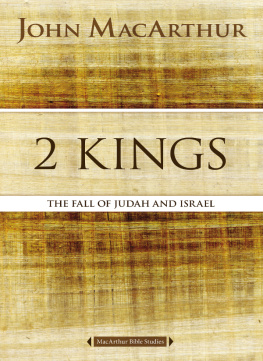MacArthur Bible Studies
JOSHUA, JUDGES, & RUTH: FINALLY IN THE LAND
2016 by John MacArthur
All rights reserved. No portion of this book may be reproduced, stored in a retrieval system, or transmitted in any form or by any meanselectronic, mechanical, photocopy, recording, scanning, or otherexcept for brief quotations in critical reviews or articles, without the prior written permission of the publisher.
Published in Nashville, Tennessee, by Nelson Books, an imprint of Thomas Nelson. Nelson Books and Thomas Nelson are registered trademarks of HarperCollins Christian Publishing, Inc.
Originally published in association with the literary agency of Wolgemuth & Associates, Inc. Original layout, design, and writing assistance by Gregory C. Benoit Publishing, Old Mystic, Connecticut.
Unleashing Gods Truth, One Verse at a Time is a trademark of Grace to You. All rights reserved.
Thomas Nelson, Inc. titles may be purchased in bulk for educational, business, fundraising, or sales promotional use. For information, please e-mail SpecialMarkets@ThomasNelson.com.
Scripture quotations are taken from The New King James Version. 1982 by Thomas Nelson, Inc. Used by permission. All rights reserved.
Some material from the Introduction, Keys to the Text and Exploring the Meaning sections taken from The MacArthur Bible Commentary, John MacArthur, Copyright 2005 Thomas Nelson Publishers.
ISBN 978-0-7180-3471-9
ISBN 978-0-7180-3484-9 (eBook)
First Printing February 2016
CONTENTS
In this ebook edition, please use your devices note-taking function to record your thoughts wherever you see the bracketed instructions [Your Notes] or [Your Response]. Use your devices highlighting function to record your response whenever you are asked to checkmark, circle, underline, or otherwise indicate your answer(s).
A fter the exodus from Egypt, the people of Israel, now freed from slavery, wandered in the wilderness for forty yearsbut that was not the original plan. The people were supposed to go directly from the land of bondage into the Promised Land of Canaan. But they had been unwilling to trust God, so He waited until an entire generation died before leading the nation of Israel into Canaan.
Our studies open at the time when the Israelites are entering Canaan under the leadership of Joshua. Beginning with the crossing of the Jordan River, we will cover a span of many hundreds of years, culminating in the life and death of Samson. During this time period, we will discover two overriding themes: (1) Gods people lived in a continuing cycle of sin and repentance, but (2) God was always faithful.
In these twelve studies, we will examine the biblical events depicted in the books of Joshua, Judges, and Ruth. We will look at the miraculous parting of the Jordan River, continue through some of Israels victories and setbacks in the land of Canaan, and conclude with the people settling into the land during the time of the judges. We will study the lives of some of the Bibles heroes of the faith and the lives of a few of Gods people who failed at times .
Through it all, you will learn some precious truths in this study about the character of God, and you will see His great faithfulness in keeping His promises. You will learn, in short, what it means to walk by faith.
THE BOOK OF JOSHUA
This is the first of twelve historical books in the Old Testament. It gained its name from the exploits of Joshua, the understudy whom Moses commissioned as a leader in Israel. Joshua means Jehovah saves or the LORD is salvation, and corresponds to the New Testament name Jesus. God delivered Israel in Joshuas day when He was personally present as the saving commander who fought on Israels behalf.
AUTHOR AND DATE
Although the author is not named, the most probable candidate is Joshua, who was the key eyewitness to the events. Joshua was born in Egyptian slavery, trained under Moses, and by Gods choice rose to his key position of leading Israel into Canaan. An assistant whom Joshua groomed could have finished the book by attaching such comments as those concerning Joshuas death (see 24:2933). Some have even suggested this section was written by the high priest Eleazar or his son, Phinehas. The book was completed before Davids reign, and the most likely writing period is c. 14051385 BC.
BACKGROUND AND SETTING
Israel was at the end of its forty-year wilderness wandering period (c. 1405 BC) when Moses passed the baton of leadership on to Joshua, who would have been approaching ninety years of age at the time. As the book opens, the Israelites are poised on the plains of Moab, east of the Jordan River and the land that God had promised. They faced peoples on the western side who had become so steeped in iniquity that God would cause the land to spew them out, so to speak (see Leviticus 18:2425). God would give Israel the land by conquest, primarily to fulfill the covenant He had pledged to Abraham and his descendants, but also to pass just judgment on the sinful inhabitants.
HISTORICAL AND THEOLOGICAL THEMES
A keynote feature of the book is Gods faithfulness to fulfill His promise of giving the land to Abrahams descendants. By His leading, the people inhabited the territories east and west of the Jordan River. Related to this theme is Israels failure to press their conquest to every part of the land (Judges 12 later describes the tragic results from this sin). God wanted His people to possess the land (1) to keep His promise (see Genesis 12:7); (2) to set the stage for later developments in His kingdom plan (positioning Israel for events during the periods of the kings and prophets); (3) to punish those who were an affront to Him because of extreme sinfulness; and (4) to be a testimony to other peoples as Gods covenant heart reached out to all nations.
INTERPRETIVE CHALLENGES
Miracles always challenge readers either to believe that the God who created heaven and earth can do other mighty works, or to explain them away. As in Moses day, the miracles in this book were part of Gods purpose, including (1) His holding back of the Jordans waters (see Joshua 3:717); (2) the fall of Jerichos walls (see 6:127); (3) the hailstones (see 10:111); and (4) the long day (see 10:1215). Other challenges include (1) how Gods blessing on the harlot Rahab, who responded to Him in faith, related to her telling a lie; (2) why Achans family members were executed with him; and (3) why Ai, with fewer men than Israel, was hard to conquer. These questions will be addressed in this study.
THE BOOK OF JUDGES
The book bears the fitting name Judges, which refers to the unique leaders God gave to His people to preserve them against their enemies. The Hebrew title means deliverers or saviors, as well as judges. Twelve such judges arose before the time of Samuel, and then Eli and Samuel increased the count to fourteen. Judges spans about 350 years from Joshuas successful conquest (c. 1398 BC) until Eli and Samuel judged prior to the establishment of the monarchy (c. 1051 BC).
AUTHOR AND DATE
No author is named in the book, but the Jewish Talmud identifies Samuel, a key prophet who lived at the time these events took place. The date of composition was earlier than Davids capture of Jerusalem (c. 1004 BC), since Jebusites still controlled the site. Also, the writer deals with a time before a king ruled. Saul began his reign c. 1051 BC, so a time shortly after his rule began is probably when Judges was written.
BACKGROUND AND SETTING
Judges is a tragic sequel to Joshua. In Joshua, the people were obedient to God in conquering the land. In Judges, they were disobedient, idolatrous, and often defeated. The account describes seven distinct cycles of Israels drifting away from the Lord, starting even before Joshuas death and with a full departure into apostasy afterward. Five basic reasons are evident for these cycles of Israels moral and spiritual decline: (1) failure to drive the Canaanites out of the land; (2) idolatry; (3) intermarriage with Canaanites; (4) not obeying the judges; and (5) turning away from God after the death of the judges. A four-part sequence repeatedly occurred during this phase of Israels history: (1) Israels departure from God; (2) Gods judgment in permitting military defeat and subjugation; (3) Israels prayer for deliverance; and (4) God raising up judges to lead in shaking off the oppressors.
Next page
